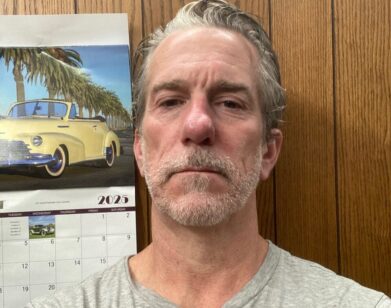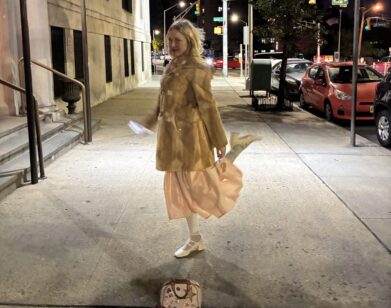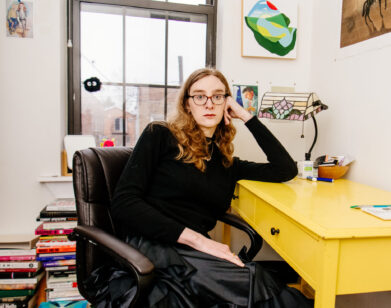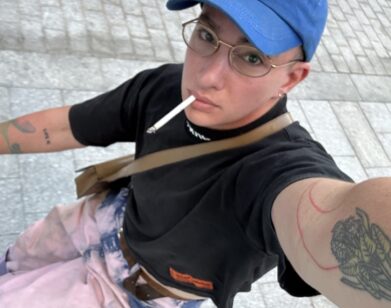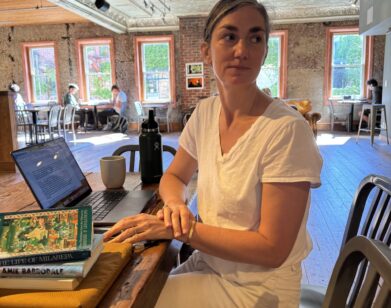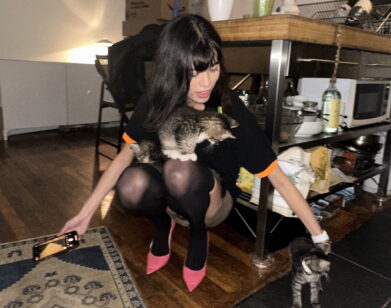Emily Gould Is Looking Forward to Menopause
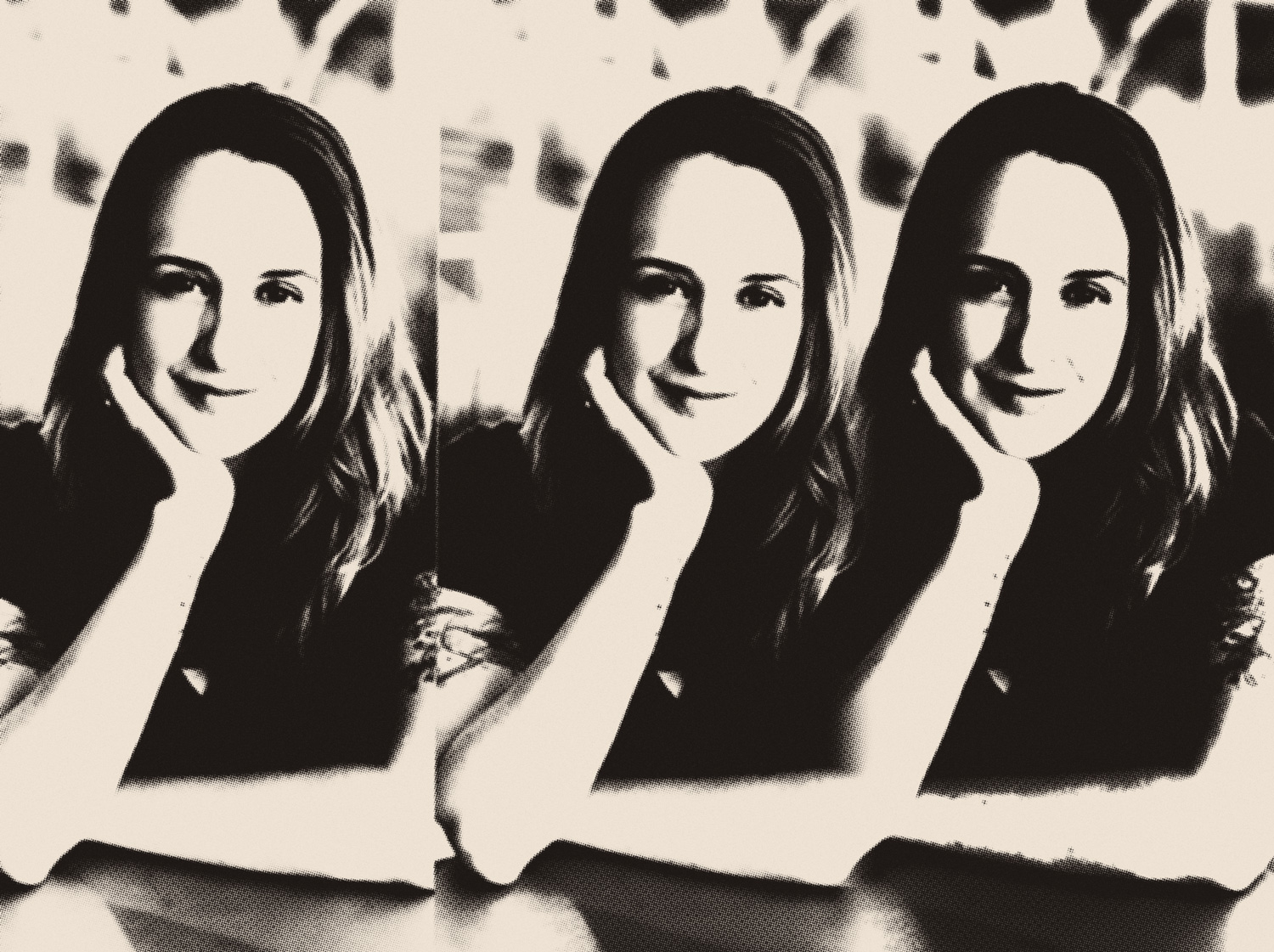
Photo by Sylvie Rosokoff. Edit by Jack Vhay.
Emily Gould is the pioneer of oversharing online. From her early blogging days—amicably titled Heartbreak Soup!—to her tenure at Gawker, where she was the lightning rod of the Gawker-Stalker controversy, Gould has always been at the center of an ecosystem of excessive digital publication. But Gould has spent the past decade or so involving herself with paper, founding the publishing imprint “Emily Books” with her longtime friend and collaborator Ruth Curry, and writing three novels.
Now, Emily Books is shuttering, but her new book Perfect Tunes, is close to home. Gould wrote the first drafts of the book, which follows a young songwriter navigating the East Village at the turn of the millennium, while pregnant with her second child. Getting on the phone with the notoriously bubbly Gould, you can’t help but hear the leak of life pressures hissing through, especially in quarantine. Children are by definition violators of space, demanding a near constant state of attention, but the writer is a creature nurtured by silence and isolation. It’s a difficult bind, made all the more challenging without childcare. What does it take to protect your creative life as a woman, a mother? Gould and I discuss options.
–––
SHANTI ESCALANTE: I know that a lot of authors whose books are coming out right now are kind of scared because they can’t do proper book promotion. How are you feeling about releasing Perfect Tunes right now?
EMILY GOULD: Well, I have to admit I was excited to spend two weeks in hotels by myself. Our last book [to be published by Emily Books], Temporary by Hilary Leichter just came out, and I feel so bad that she can’t do live readings since it’s her debut book.
ESCALANTE: Recently you published a piece where you write about the power of women’s stories: “I still do this kind of writing. I am doing it now, but I no longer hope for any other outcome other than my own relief. This is because I have lost faith in the idea that there might be anything any individual can say or write that will change the minds of people who, consciously or subconsciously, believe that women matter less than men.” Is this loss of faith related at all to your decision to shutter Emily Books, which publishes women’s writing?
GOULD: That was a part of it. But more so, we were just tired. Publishing takes a lot of work, and requires you to be a bit of a masochist, which neither of us turned out to be. I just thought, let me charge my batteries, regroup, and focus on other things and other kinds of work and then sort of return to the battle field, because I don’t actually believe that the situation is hopeless. It definitely feels hopeless a lot of the time, but …
It’s weird. So many people wanted to write and reassure me after I published that essay, and then other people wanted to also write and tell me I was really wrong about everything. I actually had one person who wanted to “not all men” me about it. I was just like, I can’t have this conversation. We’re not there yet. Having done this kind of work for so long, I really don’t have time anymore for people who are not coming to the conversation in good faith. Some people are a lost cause and they’re never going to get it. I just had to teach myself how to be okay with that. It’s a bummer.
ESCALANTE: Your book reminded me of this interview that Elena Ferrante did a few years back, where her interviewer asked her, “What do you hope your readers take away from your books?” Ferrante responded, “That even if we are constantly tempted to lower our guard out of love or weariness or sympathy or kindness, we women shouldn’t do it. We can lose from one moment to the next, everything that we have achieved.” Do you share Ferrante’s position? It certainly feels like Laura [in Perfect Tunes] lost grip of her dreams from one moment to the next, out of love.
GOULD: That’s pretty all or nothing—and bleak. Although it’s probably true in terms of most women’s real lives. I think that I wanted to preserve the hope that you use a lot by letting down your guard, but there’s a chance that you could get it back. I have really high hopes for the entire rest of my life. For a woman to choose to have children, the reproductive years are really, really, really, really hard. I think that’s across the board. Especially in America, where there’s so little structural support for motherhood.
I see women who I admire really striving and flourishing when their kids start to be much more independent, than they were in their late teens or early 20s. This might sound really naïve, but I’ve heard menopause described as a time in your life when you get back to the first unselfconscious ways that you emotionally were when you were like 10 and you were fully in your weird self and didn’t really care what anyone else thought of you. I’m sure that’s not everyone’s experience, but the idea that it could be, the hope that it could be, is something that really keeps me going. I’ve seen it happen. There are a lot of writers especially that start to come into their own in their 40s and 50s and 60s.
ESCALANTE: That’s nice to hear!
GOULD: I don’t know. I may be scraping the bottom of the barrel here, but for some reason I have 47 in my mind as the age when my life starts really coming together.
ESCALANTE: Despite these obstacles we’re talking about, you managed to write this book with two young kids in your life. What was that like—trying to bring this book into life while raising your own children?
GOULD: Well, I’m really, really, really lucky to have as good of a support system as I have. It definitely felt like it took a much longer time than I wanted it to, so that was very frustrating. Especially because I began my career as a blogger—this shift from instant gratification to, like, maybe you get a tiny bit of gratification four to seven years later, that’s a big shift. There were definitely a lot of days that I felt like I just had not accomplished anything and never would accomplish anything ever again.
In the acknowledgements of Perfect Tunes, I thank my babysitter and the person who introduced me to my babysitter, who sort of taught me a lot about motherhood and being a person and balancing those things. That really is what enabled me to write the book, knowing that my kids were with someone who I loved and trusted. I know that there are people who are able to balance childcare responsibilities and also write at the same time. There are authors who I really admire, both now and also throughout history, that have been like, “Oh I wrote half of this novel on the back of a receipt while I was nursing my infant.” I’m not one of those people. I really wish that I was, but I need hours of time with my children ideally not in the same zip code.
ESCALANTE: Right.
GOULD: That’s only been possible because I’ve been able to afford as much childcare as possible. But that wasn’t always the case. When my younger son was one and a half he had a babysitter part time, mornings. I remember feeling so conflicted about that. Then, by the time I had the second child, I remember having conversations with Keith [Gessen], my husband, and being like, “We need to get as much childcare as we can possibly afford. It’s our number one priority.” Full stop, I was not hesitant about it at all. I had gotten all of the feelings that Laura experiences in the book. She misses the physical presence of her daughter every time she’s not with her. All of that was out of my system with the first child and by the time I had the second child. I love him, I love cuddling, I love to smell the top of his adorable head. Then when I’m not with him, I never think about him. I would like to thank therapy and a good SSRI and my babysitter for that.
ESCALANTE: The book deals with what it means to understand your mother and the choices she’s made. Did you feel more empathetic towards your own mother after having your kids? Is that the spark that inspired the book?
GOULD: I’m really fascinated by the idea of who mothers were before they became mothers, in general. I think about it in the context of my own mother. I remember finding a journal that she’d kept in her early 20s that didn’t even have a lot of writing in it. It mostly had these very beautiful pen and ink sketches that she’d made. My mom is not an artist. She’s a court-appointed lawyer for abused and neglected kids in D.C. She’s kind of one the most not-an-artist people I know, actually. Just to see this other part of her personality that was totally someone I’ve never met—I don’t want to say it’s inherently sad, but it was a little bit heartbreaking for me because clearly there are definitely parts of herself that she had to give up in order to become the person who I would meet as her child. I’m pretty sure that’s true for everyone.
I know it’s true for me. I know that there’s a previous self who died in order for my children to be born. It’s one of those things in life that’s just sad, but also sort of beautiful in its sadness. I think having children is really, really horrible sometimes. But it gives you access to this whole other world of feelings and experiences that weren’t available to me before I became a parent. For that reason alone, I have to sort of recommend it. If you buy an admissions ticket to an amusement park, you feel an obligation to ride all the rides.
ESCALANTE: That’s a good way to put it. Do you play an instrument?
GOULD: No. I’m actually really bad at music. I’m a decent singer. I really enjoy doing karaoke, but I think I enjoy karaoke because I like performing, not because I’m a talented singer. My family is actually really musical. My dad and my brother are both, not professional musicians, but they both have that kind of musical proficiency. That sort of natural ear where you can just pick up pretty much any instrument and figure it out.
ESCALANTE: That sounds like a super power.
GOULD: If I could be reincarnated or I could choose any super power, I would totally choose being a gifted musician. A million percent.
ESCALANTE: Perfect Tunes largely focuses on friendship, similarly to your last book. What hooks you about that dynamic?
GOULD: This is a pretty boring answer, but part of it is just the trace of fiction in real life. We all have probably a bunch of different friends that play a lot of different roles in our lives. That dynamic is a lot harder to convey in a novel. Although certainly people manage it, but creating two characters who are fully flushed out human beings is a lot easier task than creating like, five.
I’m also so interested in showing that you can have a relationship that changes over time and that’s not defined by men or jealousy. Women’s relationships in narratives are more sort of like, they’re friends by romance or the marriage plot, which is something that I would try to stay away from.
ESCALANTE: When did you first start writing Perfect Tunes?
GOULD: I think I started the first draft of it when I was pregnant with Rafi, so that was in 2014. Then I ended up throwing away that whole first draft because it was about literal time travel and it made no sense. But it was sort of still the idea of, who is your mother before she had you? The same characters were still in it. Laura was in it, Marie was in it. I started out with Marie’s perspective.
ESCALANTE: What kind of research did you do for the book?
GOULD: I usually have something that I’m sort of working from as, like, a template. I was rereading The House of Mirth on my laptop when I was working a temp job, because there was nothing else to do and it’s available on the public domain. I just had it open and would cover it up any time anyone walked by.
There’s also this zine “The East Village Inky” by Ayun Halliday that I started reading when I was in my early 20s–way before I became a parent. I think her daughter was born in 1999 and her son was born in 2001. Her motherhood timeline syncs up a bit with Laura’s. So as far as writing atmospheric detail, I could go to that when I was wondering, what playground would you go to? What reference is good?
ESCALANTE: What was it like revisiting the ’90s and early 2000s?
GOULD: It was really odd. I felt the timeline was really nostalgic because I was young. But also, in retrospect, it was a really interesting time for music. 2003 was a really transformative year musically. There’s this great music blogger that I’m internet friends with, Matthew Perpetua, and he does these amazing playlists that are like survey mixes of specific years. He finds things you’ve forgotten that were gems. Then he shuffles them with huge monster chart-topping hits of whatever time it was. It sort of gives you this very geeky immersion into this feeling of being alive during that year.
I was listening to those when I was working on the book and they were really helpful to remember. I especially have this sense memory of the first time I heard “Hey Ya!” It reminds me of the blackout. Were you living in New York then? The black out was just this crazy, joyful moment. Obviously not for people who were, like, in the ICU or up on life support or something, but for the vast majority of people, there is this moment at the beginning of the blackout where we all thought that, because 9/11 had happened so recently, that it was a terrorist attack and we were all fucking out of our minds with worry. Then when it became clear that it was only a blackout, everyone was like, let’s party. Everyone was eating all the ice cream that had melted.
ESCALANTE: How do you even prepare for an incoming terrorist attack?
GOULD: I mean, also I was 21 or 22. I guess that colors my perception.
ESCALANTE: One thing I was curious about was how you organized the time jumps in the book. At times they feel almost random, and we don’t even really get to see Laura pregnant or going through the kind of tremendous moment of delivery. How did you get a sense of when would be the best time to pick up the story again?
GOULD: Some scenes that I wrote sort of fell away during the process of the drafting of the book. It is a little bit random. I ended up adding in more of Marie’s early childhood. In the first intermediate draft of the book there’s a huge jump that really didn’t work because basically Marie was an infant and then she was a teenager, and you couldn’t care about Marie and you so often didn’t get a sense of how her relationship with Laura sort of changed as she got older.
This is one of the things that I had wanted to teach myself how to do with this book. In Friendship, I was like, I’m going to teach myself how to write a novel. Then this one I was like, I’m going to teach myself how to write a novel that could take place over the course of many years, because a plot that takes place over the course of a year has a sort of built in plot. Seasons, you could call them. Also, pregnancy is sort of a narrative structure.
ESCALANTE: Something I’m also interested in is Laura’s relationship with Dylan, because it’s so easy to kind of sympathize with the pull of this type of guy’s attention, even if you know he doesn’t really care about you. What was it like writing that relationship? Why do you think Laura is so drawn to him and why couldn’t she break out of that relationship sooner?
GOULD: It was hard to write because I’ve been married for so long and most of the time I was working on this book I was either pregnant or breastfeeding. I know some people who are breastfeeding can feel sexy, and love their bodies and want to have sex all the time. That was not my experience. At all. I had to work really hard to get myself into the head space of like, when you’re in your early 20s and just like want sex constantly and so many of your decisions are basically like, well, can I have sex at the end of this?
Without really getting into the details of my own romantic past, I’m pretty sure everyone’s had a relationship with someone who is so patently, obviously, totally wrong for them, but just felt really chemically right. It’s hard to extricate yourself from that situation. I try to remember that and have a lot of empathy for people going through it because it’s like, I get it. My friend Anya—she’s single—taught me the term “dick-natized.” I wanted to convey that, and also to convey Dylan as two-dimensional and obviously an asshole. Someone who’s in over his head in every respect in life. He’s not really trying to ruin Laura’s life, but that type of person leaves a lot of collateral damage in their wake.
ESCALANTE: It’s funny that he’s such a viscerally recognizable character. There are so many Dylans around.
GOULD: There are. I know.
ESCALANTE: It’s incredible.
GOULD: Even with the most beautiful, charismatic, stunningly talented women–if they’re heterosexual–it’s so rare for them to be able to really own the power that they have by being all those things. I think deep down, because of having grown up surrounded by everything that women imbibe from the moment they’re born basically, they’re insecure on some level. Whereas men who are hot just do not have to develop any other redeeming characteristics. They get away with so much.

